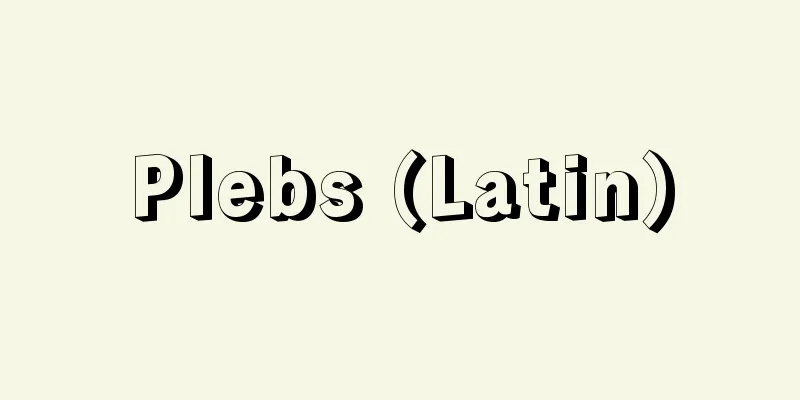Plebs (Latin)

|
The common people of ancient Rome. In the early period, it was a general term for various citizens who did not belong to the patrician class (aristocracy). From the early to mid-Republic, the plebeians fought a "status struggle" against the patricians, demanding freedom from debt-based slavery, land allocations, and the appointment to high-ranking government positions, and won successive concessions from the patricians, who needed the plebs as an essential component of their heavy infantry militia. According to legend, the office of tribune was created in the "Holy Mountain Incident" in 494 BC, the Plebeian Assembly was established in 472 BC, the Twelve Tables were enacted in 450 BC, the right to marry patricians was obtained in 445 BC, the former Veii territory was allocated to them in the early 4th century BC, the Law of Licinius-Sextius in 367 BC confirmed that a plebeian could become one of the consuls (consuls or governors), and the Law of Hortensius in 287 BC determined that the resolutions of the Plebeian Assembly were legally valid without the approval of the Senate. However, from the second half of the 4th century BC, the plebeians who became consuls were limited to the highest class, and together with the patricians, they formed a new aristocracy (nobilitas), preventing newcomers from entering the political world, and the democratization of Rome was not achieved. In addition, the upper plebeians rose to the rank of knights, second only to the senatorial rank, and the plebeians themselves became the third estate. Towards the end of the Republic, the growing number of lower commoners, or proletarians, strengthened their ties with powerful generals, becoming their private armies and military and political clientes (protected people) who voted for the generals in the popular Assembly, and came to determine the outcome of the civil war. [Ryuichi Hirata] "The Plebeians" by Yuzo Mori (included in "Ancient History Lecture Series 6", 1962, Gakuseisha) " "The State and State Thought of the Romans" by E. Meyer, translated by Isshu Suzuki (1978, Iwanami Shoten) Source: Shogakukan Encyclopedia Nipponica About Encyclopedia Nipponica Information | Legend |
|
古代ローマの平民階級。初期にはパトリキ(貴族)に属さない雑多な市民の総称。共和政初期から中期までパトリキに対し、負債による隷属状態からの解放、土地の分与、高級官職への就任を要求して「身分闘争」を行い、重装歩兵市民軍の不可欠の構成要素としてプレブスを必要としたパトリキの譲歩を次々にかちとっていった。すなわち、伝承によれば、紀元前494年の「聖山事件」で護民官職の創設、前472年平民会の設立、前450年成文法(十二表法)の制定、前445年パトリキとの通婚権を獲得し、前4世紀初頭旧ウェイイ領の土地を分与され、前367年リキニウス‐セクスティウス法でコンスル(執政官または統領)の1人に平民が就任することが確認され、さらに前287年ホルテンシウス法で平民会の議決は元老院の認可がなくとも法的に有効であることが決定された。しかし前4世紀後半以降、コンスルに就任したプレブスは最上層部に限られ、彼らはパトリキとともに新貴族(ノビリタスnobilitas)を形成し、新人の政界進出を阻み、ローマの民主化は達成されなかった。また、上層プレブスは元老院身分に次ぐ騎士身分に上昇し、プレブス自体は第三身分となった。共和政末期、増大する下層平民=プロレタリーは、有力将軍との結び付きを強め、その私兵的存在となり、民会ではその将軍のために投票する軍事的・政治的クリエンテス(被護民)となって、内乱の帰趨(きすう)を左右するに至った。 [平田隆一] 『森裕三著『プレブス』(『古代史講座 6』所収・1962・学生社)』▽『E・マイヤー著、鈴木一州訳『ローマ人の国家と国家思想』(1978・岩波書店)』 出典 小学館 日本大百科全書(ニッポニカ)日本大百科全書(ニッポニカ)について 情報 | 凡例 |
Recommend
Desexualization
...For example, when a person directs their longi...
Huber, W.
…refers to a group of painters active in the area...
Occupational hygiene
Research and practical activities on ensuring the...
Digambara
...It was passed down to the surviving members of...
seal
Abbreviation of the English word sealskin. Refers ...
Josetsu - Josetsu
Years of birth and death unknown. A painter-monk ...
Kushiro Plain - Kushiro Heiya
An alluvial plain located downstream of the Kushi...
Arthrothamnus bifidus (English spelling) Arthrothamnusbifidus
…A group of seaweeds in the brown algae family La...
Council of Councilors - Hyojoshu
In the Kamakura Shogunate, these were the members...
Hey - John Milton Hay
American poet, journalist, and politician. Born i...
Waterfall mouth - Takiguchi
[1] 〘Noun〙① The place where a waterfall falls. The...
Kanichi Shrine - Kanichi Shrine
...This is Ozaki Koyo's lifetime full-length ...
Demon's Eye Three-volume Summary - Kiichi Hogen Sanryaku no Maki
Joruri Gidayubushi. Historical piece. Five acts. ...
gja (English spelling) gja
...It is a volcanic island whose northern side bo...
Administration of justice
It involves the establishment and management of t...









